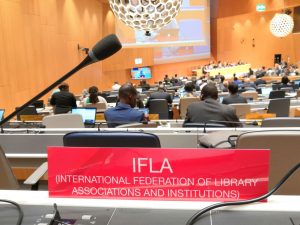
On July 15 & 18, the Standing Committee on Copyright & Related Rights (SCCR) presented the outcomes of its 42nd meeting (SCCR/42) to the WIPO General Assembly. IFLA was there to reiterate support for strong limitations & exceptions (L&E) for libraries. We were joined on-site by other organizations – including EIFL – and national delegates – including those from South Africa, Iran, Malawi, Brazil, and Uganda – who spoke of their support for strong L&E’s and the WIPO African Group’s proposal that was adopted into a workplan at SCCR/42 two months earlier.
At SCCR/42, members agreed to move ahead with the African Group’s plans for presenting a toolkit for countries to develop preservation exceptions & limitations to copyright for libraries, archives and museums; a report on cross-border factors in copyright law; and a scoping study on research exceptions for such uses as data mining.
Speaking to the interests of the Assembly, IFLA representatives noted that strong L&E’s underlie other rights to culture, education, and research and in turn support IP innovation in multiple sectors, including for the benefit of society, as well as the preservation of records that tell the story of how we got to where we are now.
At the same time, IFLA expressed fear of limited urgency from the group as a whole to support limitations & exceptions and facilitate international collaboration. As the pandemic and climate change have demonstrated, overly-restrictive IP policies create confusion around whether libraries can offer digital access to material when crises force temporary physical closures of facilities, and natural disasters risk regrettably destroying facilities permanently – and with them, potentially, the only copies of materials if clear exceptions do not allow backups to be made and made accessible.
Crucially, cross border factors cannot be addressed by any nation alone, and WIPO as an agency is equipped to address them.
Crises will happen. Innovations happens because people can work with and reuse materials protected by intellectual property. We need to mitigate challenges and seize opportunities with a flexible copyright system that ensures that researchers and the public are not stalled by overly-restrictive licenses and laws such that when buildings temporarily close, we cannot access digital content, or when a flood or fire destroys an archive, that material is lost forever because there is no backup. If these happen, the lost IP can benefit no one.
IFLA looks forward to continuing to speak to the interests of libraries at WIPO at next year’s SCCR/43 and future General Assemblies!
[this blog post was adapted from the statement IFLA delivered at WIPO GA 63)